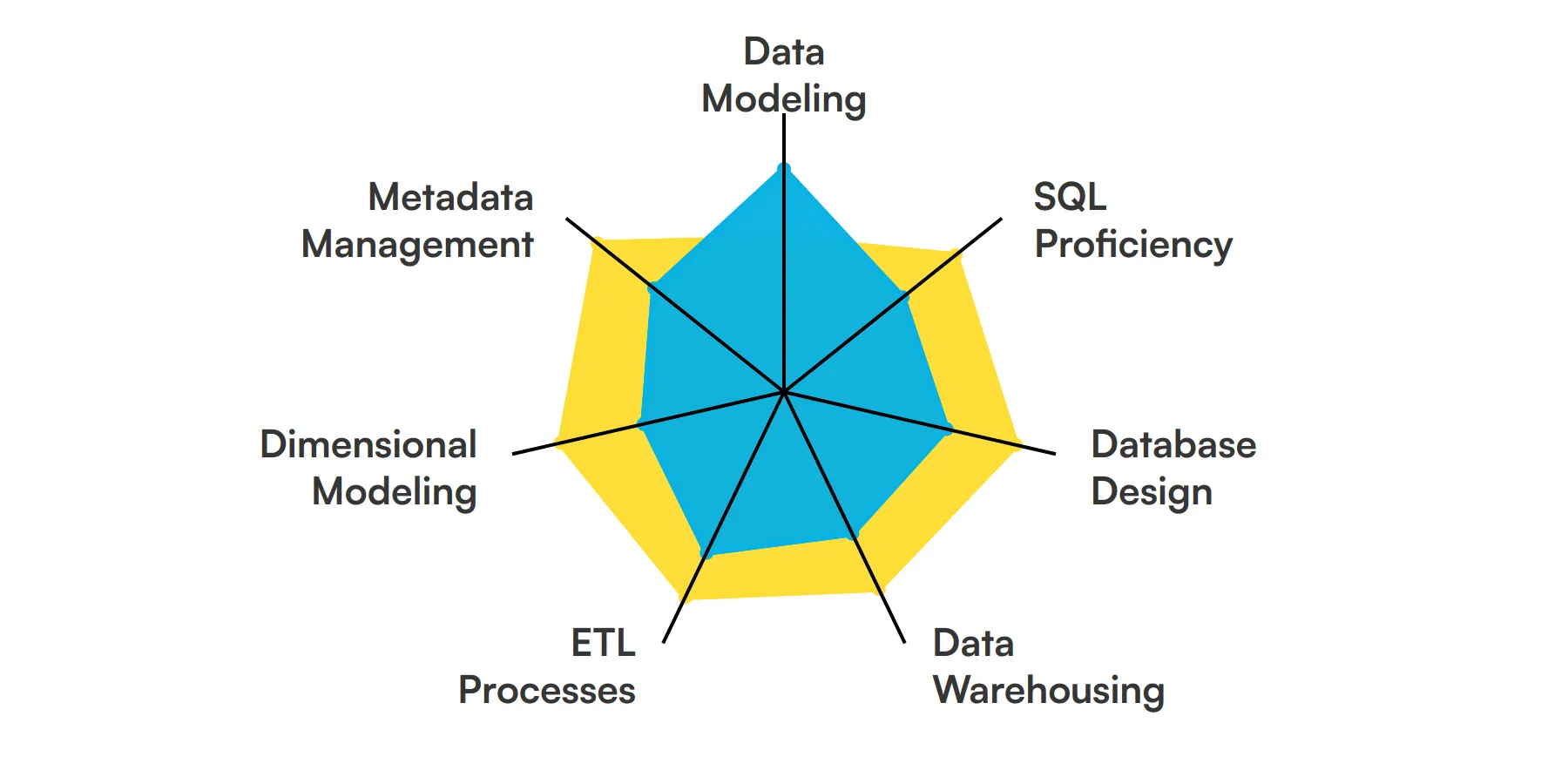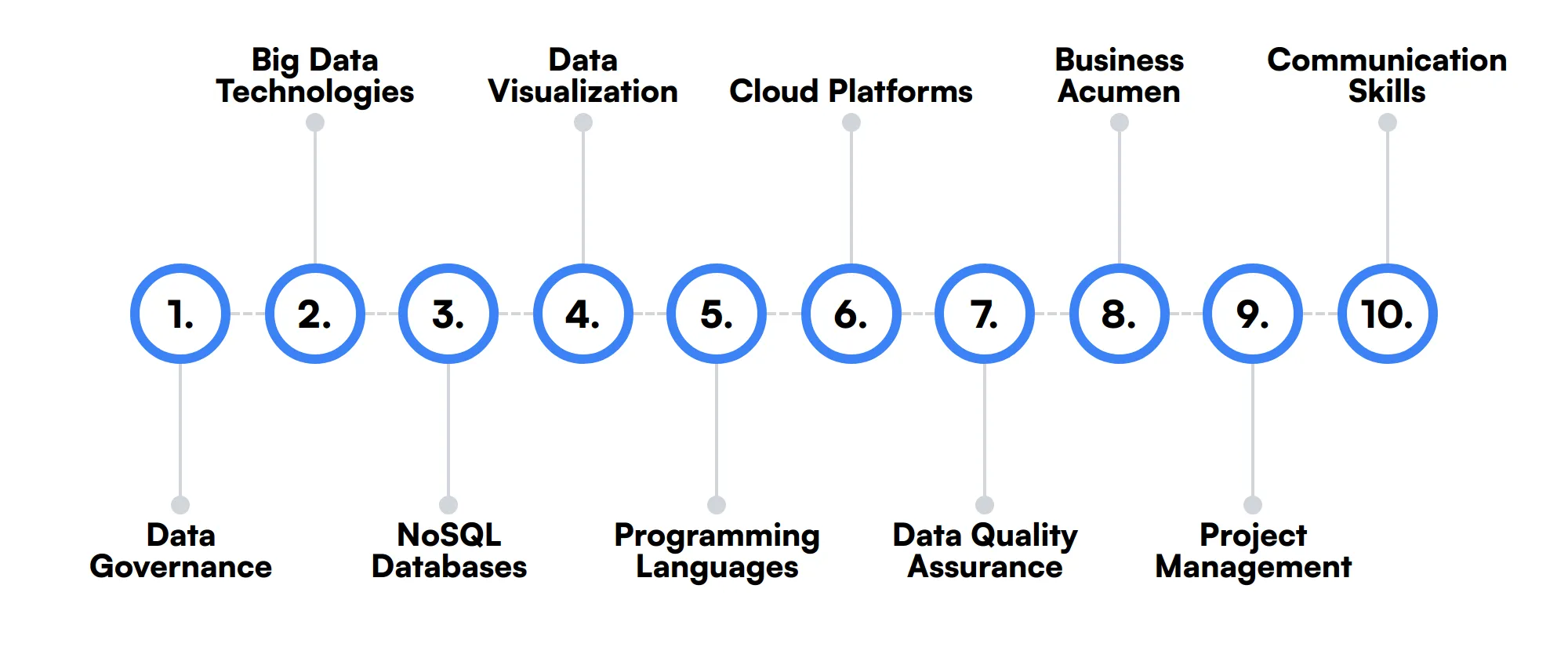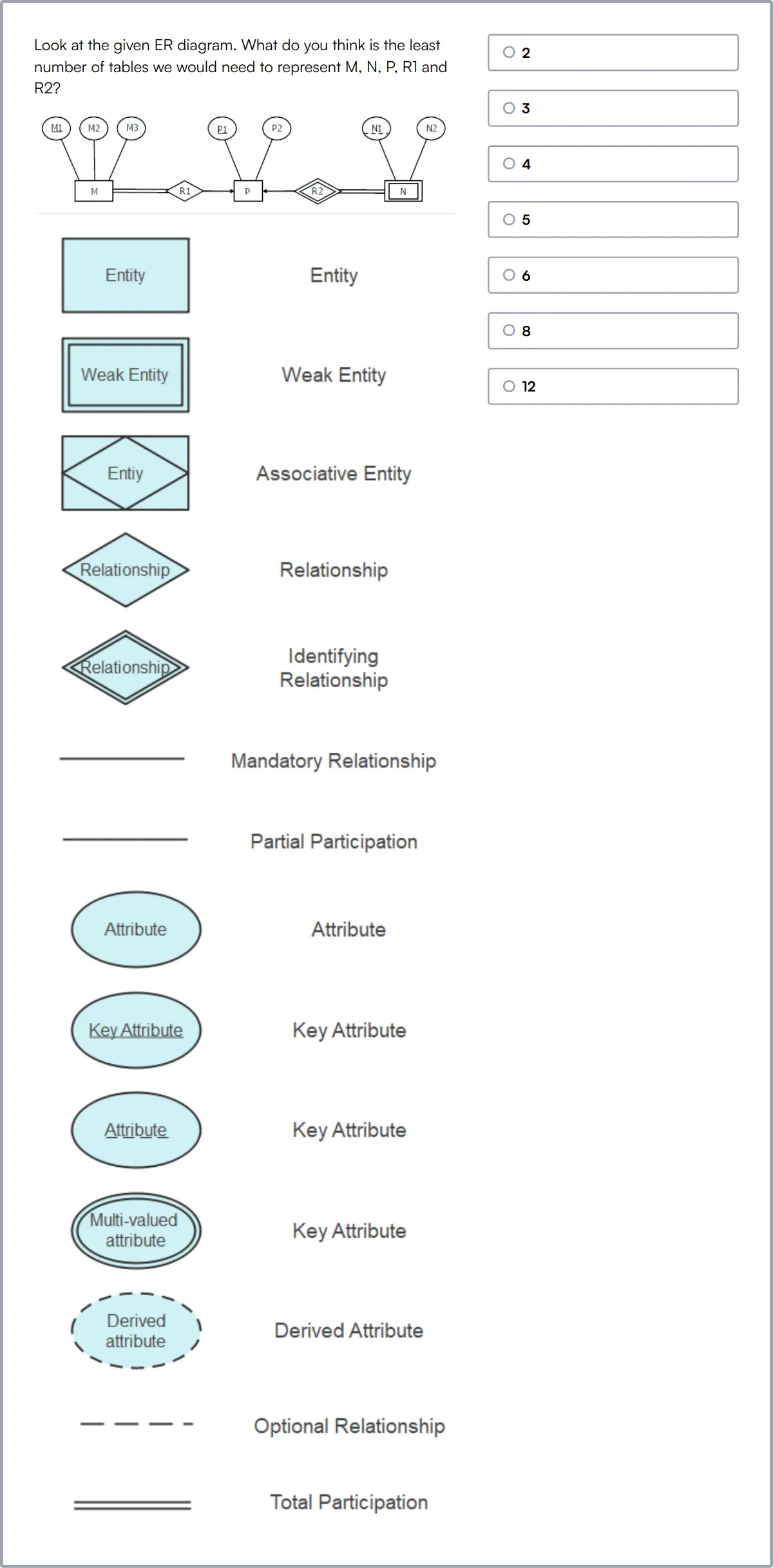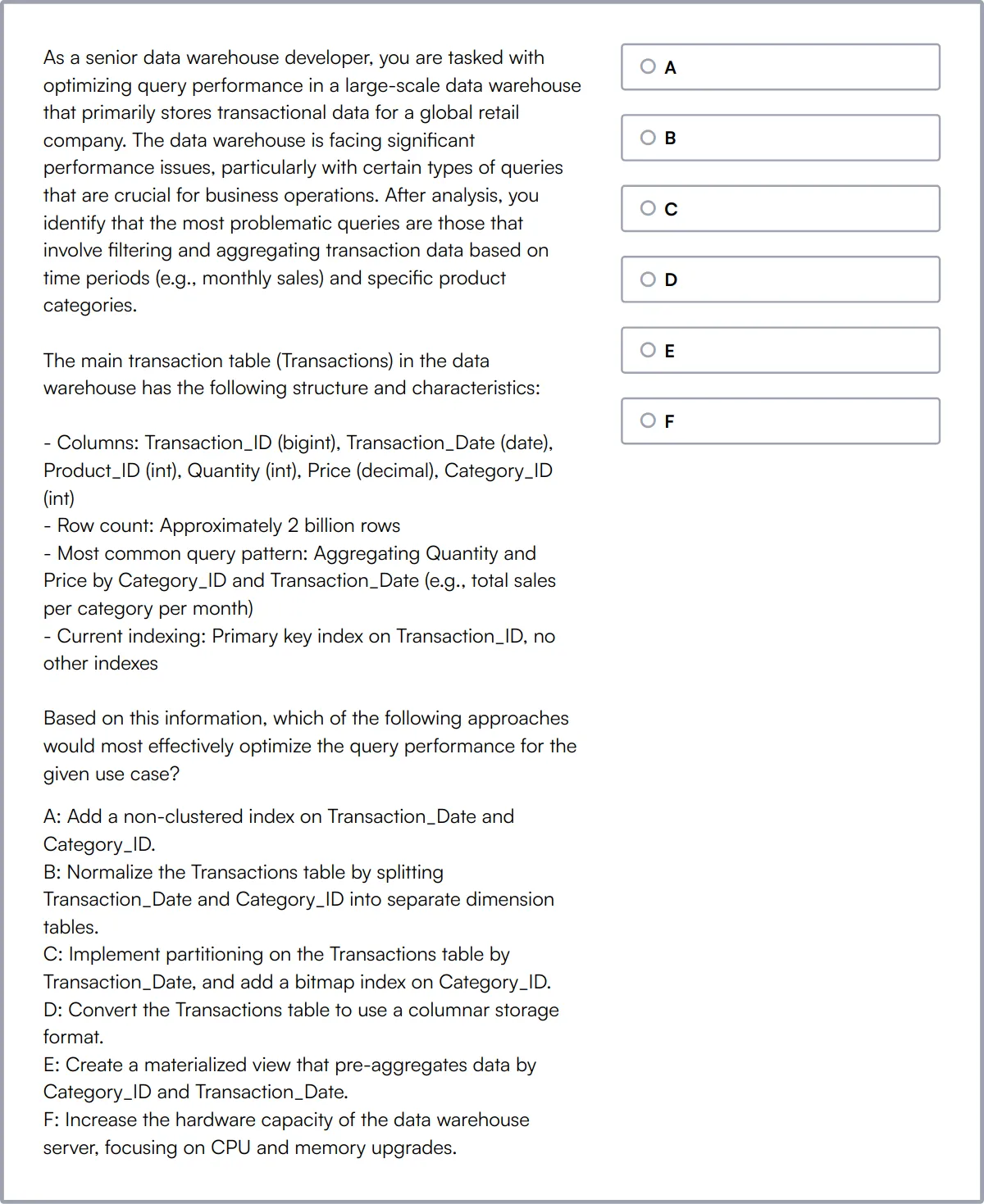Data modelers play a key role in shaping how data is structured and accessed within an organization. They create and manage data models that ensure data is organized, accurate, and accessible for various business needs.
Skills required for data modeling include proficiency in database management systems, understanding of data warehousing concepts, and strong analytical abilities. Additionally, effective communication and problem-solving skills are crucial for translating business requirements into data models.
Candidates can write these abilities in their resumes, but you can’t verify them without on-the-job Data Modeler skill tests.
In this post, we will explore 7 essential Data Modeler skills, 10 secondary skills and how to assess them so you can make informed hiring decisions.
Table of contents
7 fundamental Data Modeler skills and traits
The best skills for Data Modelers include Data Modeling, SQL Proficiency, Database Design, Data Warehousing, ETL Processes, Dimensional Modeling and Metadata Management.
Let’s dive into the details by examining the 7 essential skills of a Data Modeler.

Data Modeling
Data modeling is the process of creating a visual representation of a system's data. A data modeler uses this skill to design and structure databases, ensuring data is organized and accessible. This skill is crucial for translating business requirements into technical specifications.
For more insights, check out our guide to writing a Data Modeler Job Description.
SQL Proficiency
SQL (Structured Query Language) is the standard language for managing and manipulating databases. A data modeler must be proficient in SQL to query databases, create tables, and manage data relationships. This skill is essential for ensuring data integrity and optimizing database performance.
Database Design
Database design involves structuring a database in a way that supports efficient data storage and retrieval. A data modeler uses this skill to create schemas, define relationships, and ensure data normalization. Proper database design is key to maintaining data consistency and performance.
Data Warehousing
Data warehousing involves the collection and management of large volumes of data from different sources. A data modeler uses this skill to design and implement data warehouses, enabling efficient data analysis and reporting. This skill is important for supporting business intelligence and decision-making processes.
Check out our guide for a comprehensive list of interview questions.
ETL Processes
ETL (Extract, Transform, Load) processes are used to move data from various sources into a data warehouse. A data modeler must understand ETL to design workflows that ensure data is accurately and efficiently transferred. This skill is crucial for maintaining data quality and consistency.
Dimensional Modeling
Dimensional modeling is a design technique used to structure data for easy retrieval and analysis. A data modeler uses this skill to create star and snowflake schemas, which simplify complex data queries. This skill is essential for supporting data warehousing and business intelligence efforts.
For more insights, check out our guide to writing a Data Architect Job Description.
Metadata Management
Metadata management involves the administration of data that describes other data. A data modeler uses this skill to ensure that metadata is accurate, consistent, and accessible. This skill is important for improving data governance and facilitating data discovery.
10 secondary Data Modeler skills and traits
The best skills for Data Modelers include Data Governance, Big Data Technologies, NoSQL Databases, Data Visualization, Programming Languages, Cloud Platforms, Data Quality Assurance, Business Acumen, Project Management and Communication Skills.
Let’s dive into the details by examining the 10 secondary skills of a Data Modeler.

Data Governance
Data governance involves the management of data availability, usability, integrity, and security. A data modeler should understand data governance to ensure compliance with policies and regulations.
Big Data Technologies
Familiarity with big data technologies like Hadoop and Spark can be beneficial. A data modeler may use these tools to handle large datasets and perform complex data processing tasks.
NoSQL Databases
Knowledge of NoSQL databases like MongoDB and Cassandra is useful for handling unstructured data. A data modeler might use these databases to store and manage data that doesn't fit into traditional relational models.
Data Visualization
Data visualization involves creating graphical representations of data. A data modeler can use this skill to present data insights in a clear and understandable way, aiding in decision-making.
Programming Languages
Proficiency in programming languages like Python or R can be advantageous. A data modeler might use these languages for data manipulation, analysis, and automation tasks.
Cloud Platforms
Experience with cloud platforms like AWS, Azure, or Google Cloud is beneficial. A data modeler may use these platforms to deploy and manage databases in a scalable and cost-effective manner.
Data Quality Assurance
Data quality assurance involves ensuring the accuracy and reliability of data. A data modeler should understand techniques for validating and cleansing data to maintain high data quality.
Business Acumen
Understanding business processes and requirements is important for a data modeler. This skill helps in translating business needs into technical data models that support organizational goals.
Project Management
Project management skills can help a data modeler in planning, executing, and monitoring data modeling projects. This ensures that projects are completed on time and within scope.
Communication Skills
Effective communication is key for a data modeler to collaborate with stakeholders and team members. This skill helps in clearly conveying technical concepts and requirements.
How to assess Data Modeler skills and traits
Assessing the skills and traits of a Data Modeler involves more than just glancing at their resume. While a resume might highlight their experiences and certifications, it doesn't provide insight into their hands-on capabilities or how they approach data complexities in real-world scenarios.
To truly understand whether a candidate can handle the intricacies of Data Modeling, SQL Proficiency, Database Design, Data Warehousing, ETL Processes, Dimensional Modeling, and Metadata Management, a deeper dive into their practical skills is necessary. This is where skills assessments come into play, offering a clear picture of a candidate's ability to manage and manipulate data effectively.
Using Adaface assessments, you can create a customized test that covers all the necessary skills for a Data Modeler. This approach not only helps in identifying the most capable candidates but also streamlines the hiring process significantly. With Adaface, companies have seen a 2x improvement in the quality of hires and an 85% reduction in screening time, making it a reliable choice for your recruitment needs.
Let’s look at how to assess Data Modeler skills with these 6 talent assessments.
Data Modeling Skills Test
Our Data Modeling Skills Test evaluates a candidate's proficiency in database design, SQL, and data transformation among other key areas.
The test assesses their understanding of ER diagrams, normalization, relational schema, data integrity, and data mapping.
Successful candidates demonstrate a thorough grasp of data validation and the ability to effectively transform data according to business requirements.

SQL Online Test
The SQL Online Test measures a candidate's ability to design and manage databases, and perform complex SQL queries.
This test evaluates skills in creating and manipulating tables, executing CRUD operations, and utilizing joins and subqueries.
Candidates who score well are proficient in handling conditional expressions, procedures, and ensuring database scale and security.

System Design Online Test
Our System Design Online Test assesses candidates on their ability to design scalable and secure software systems.
The test challenges candidates with scenarios in system integration, security, performance optimization, and microservices architecture.
High-scoring individuals are adept at creating high-level design specifications and choosing appropriate architectures.
Data Warehouse Online Test
The Data Warehouse Online Test focuses on evaluating expertise in data warehousing and ETL processes.
Candidates are tested on their knowledge of SQL CRUD queries, SQL subqueries, joins, and data warehousing fundamentals.
Those who excel can effectively design, build, and maintain optimized data storage solutions.

Informatica Online Test
Our Informatica Online Test gauges a candidate's proficiency with PowerCenter for ETL and data integration tasks.
It assesses abilities in managing workflows, sessions, tasks, and designing data transformations without the need for SQL.
Successful candidates will have strong skills in data synchronization, replication, and applying complex transformation logic.
Data Analysis Test
The Data Analysis Test is designed to assess a candidate's ability to analyze and interpret data using SQL and popular data tools like Excel.
This test evaluates their skills in data queries, operations, and investigations, focusing on finding outcomes, detecting anomalies, and extracting insights.
Candidates proficient in this test can effectively project estimates and visualize data using charts and graphs.
Summary: The 7 key Data Modeler skills and how to test for them
| Data Modeler skill | How to assess them |
|---|---|
| 1. Data Modeling | Evaluate the ability to create logical and physical data models. |
| 2. SQL Proficiency | Test skills in writing and optimizing complex SQL queries. |
| 3. Database Design | Assess the capability to design scalable and efficient databases. |
| 4. Data Warehousing | Check experience in building and managing data warehouses. |
| 5. ETL Processes | Measure proficiency in designing and implementing ETL workflows. |
| 6. Dimensional Modeling | Evaluate skills in creating star and snowflake schemas. |
| 7. Metadata Management | Assess the ability to manage and utilize metadata effectively. |
Data Analytics in AWS Online Test
Data Modeler skills FAQs
What are the key skills required for a Data Modeler?
Data Modelers need a mix of skills including data modeling, SQL proficiency, database design, data warehousing, and ETL processes. They should also be familiar with dimensional modeling, metadata management, and data governance.
How can recruiters assess SQL proficiency in Data Modelers?
Recruiters can assess SQL proficiency through technical interviews, practical SQL tests, and by reviewing candidates' previous projects or case studies that demonstrate their ability to write efficient queries and manage databases.
What is the importance of data governance knowledge for Data Modelers?
Data governance is important for Data Modelers as it ensures data accuracy, privacy, and regulatory compliance. It helps in managing the data lifecycle, setting data standards, and improving data quality.
Why is business acumen important for Data Modelers?
Business acumen helps Data Modelers understand business objectives and align their data modeling and database design work to support business outcomes, leading to more effective decision-making and strategic planning.
How do Big Data technologies impact the role of a Data Modeler?
Big Data technologies require Data Modelers to handle large volumes of data and varied data types. Skills in technologies like Hadoop or Spark are often necessary, along with the ability to integrate these with traditional data modeling practices.
What role do communication skills play in the effectiveness of a Data Modeler?
Communication skills are key for Data Modelers to explain complex data concepts to non-technical stakeholders, collaborate with team members, and ensure that the data models meet business needs and technical specifications.
How can knowledge of cloud platforms benefit Data Modelers?
Knowledge of cloud platforms like AWS, Azure, or Google Cloud Platform enables Data Modelers to design and implement scalable and secure data solutions in the cloud, facilitating remote data access and cost-effective data storage solutions.
What is the significance of ETL processes in data modeling?
ETL (Extract, Transform, Load) processes are critical in data modeling as they involve preparing and transforming data from various sources into a format suitable for analysis, ensuring the data is accurate and useful for business insights.
Assess and hire the best Data Modelers with Adaface
Assessing and finding the best Data Modeler is quick and easy when you use talent assessments. You can check out our product tour, sign up for our free plan to see talent assessments in action or view the demo here:

40 min skill tests.
No trick questions.
Accurate shortlisting.
We make it easy for you to find the best candidates in your pipeline with a 40 min skills test.
Try for freeRelated posts
Free resources



